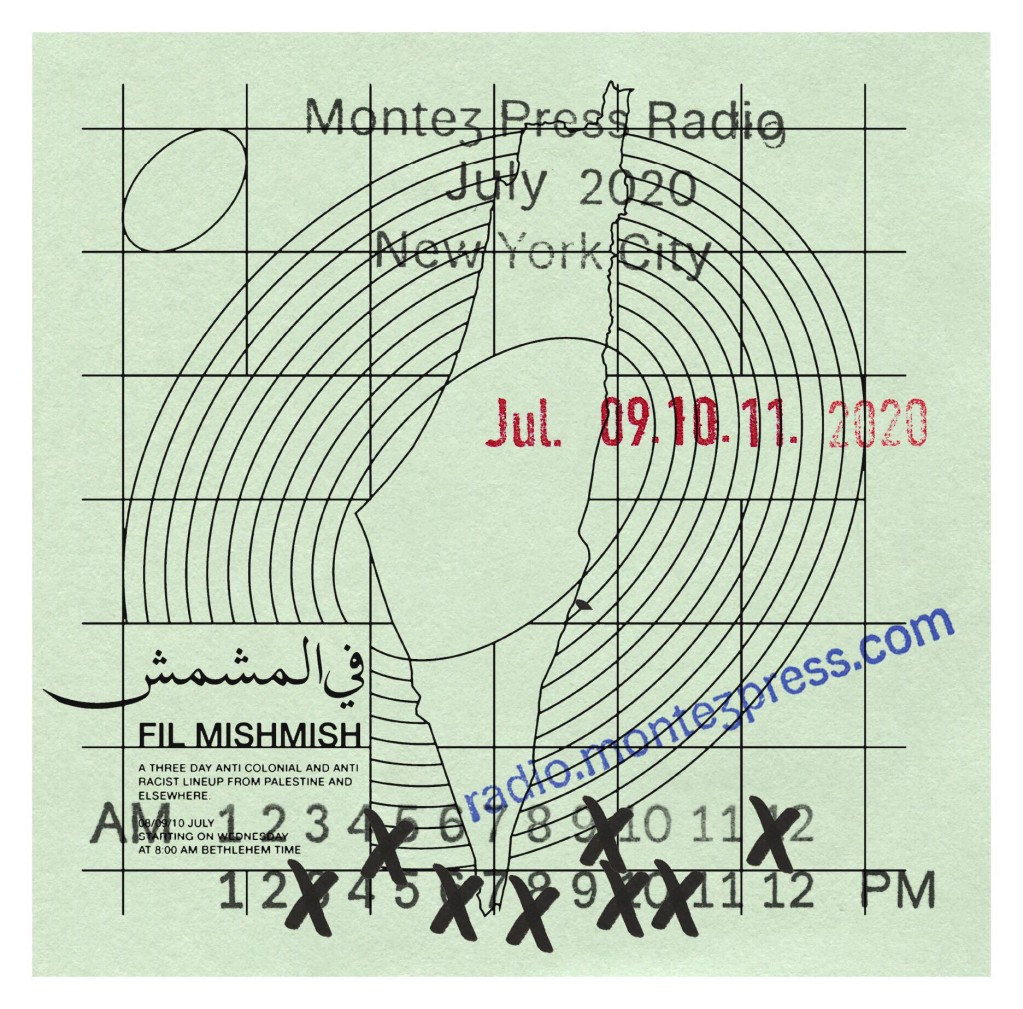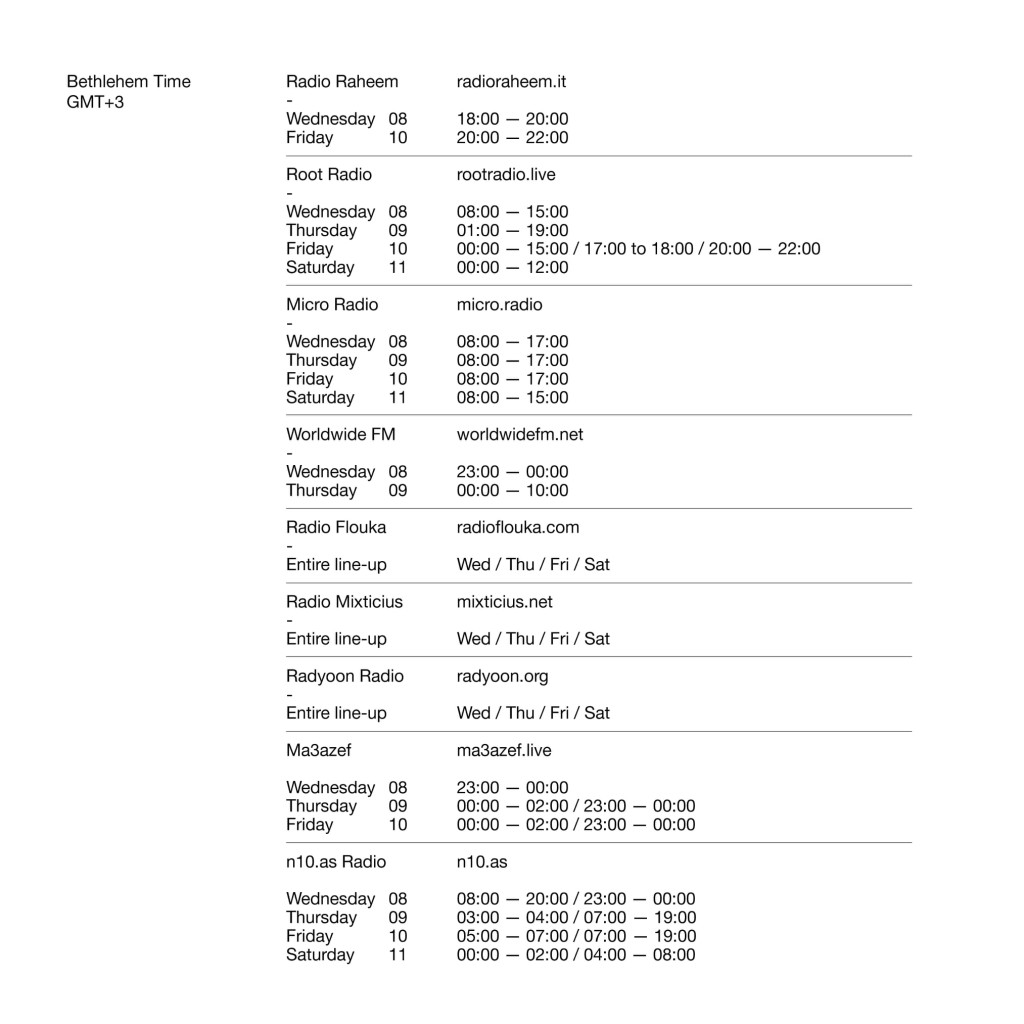Fil Mishmish – in the time of the apricots – is 72 hours of Palestinian protest music, airing online now. In an age of global disturbance, it’s drawing artists and radio stations across continents, echoing calls for systematic change.
“Please scream inside your heart.” Earlier today, this admonition from a Japanese amusement park spread across the Web. It was intended to encourage guests to reduce transmission by keeping silent. But the sign of course became an immediate expression of shared global desperation.
Music might be the only medium that can give voice to those emotions. From Black Lives Matter movements spreading globally to today’s solidarity with Arab activists, music is channeling feelings about the deepest, intergenerational challenges to societies.
The radio broadcast is “anti-annexation, anti-colonialist, anti-racist.” But it’s clear to see that the moment is now – with Palestinians facing the threat of formal annexation, atop the COVID-19 crisis. Backed by policy from the United States, Israel says it’s moving forward with plans to absorb parts of the West Bank, even though this is a violation of international law and they have an upswing in virus cases themselves. The results are assured to be catastrophic, atop 70 years of accumulated human rights abuses that have left Palestinians without even basic access to fundamental needs. (Water is just one of those denied needs, among many.)
The plan is perverse enough that even prominent supporters of Israeli policy are balking – literally, under headlines like The Washington Post editorial “I’m an ardent Zionist. But Israel’s annexation makes no sense.” (Robert Satloff, Washington Institute for Near East Policy, is about as pro-Israel as it gets. I don’t endorse his apparent love of the status quo, but it shows how far the issue has slid.) And the feeling many Palestinians express that this annexation was already de facto reality makes the frustration deeper.
At the same moment, neighboring Lebanon is on the brink, so far that it’s hard to overstate. Lebanese artists are appropriately all over this bill. And there’s the long-plummeting collapse of the currency in Syria, too. And virus in… well, you know, especially if you, too, have been doomscrolling through news on Planet Earth these days.
Politics and global change on their own can seem intractable, inhumane. Maybe what music can do is to tie people together emotionally. It’s coming at the moment when we are forced apart by a virus, but playing music together is a way of showing that emotional support.
For their part, organizers of this 72-hour marathon of music say they aim to make connections between the anti-occupation, anti-colonial, anti-racist struggle and acute battle against annexation in Palestine with parallel struggles worldwide.

Fil Mishmish is an Arabic term meaning “in the time of the apricots” or “when the apricots bloom,” which is taken non-literally to mean the equivalent of the English phrases “wishful thinking” or “when pigs fly.”
On the 8th, 9th, and 10th of July 2020, Radio alHara is organizing a three-day worldwide protest triggered by the proposed annexation of part of the West Bank. The three-day lineup will be mirrored on radio platforms across the world, from London to Tunis to Milan.
While this 72-hour event arises from events in Palestine, it addresses the anger of populations worldwide and aims to unite struggles against injustice and occupation, while acknowledging the specificity of each case. Radio alHara will lend its speakers on the ground to audio-only sets and takeovers from artists and radio stations who want to express solidarity. We hope our collective opposition resonates around the world.
In addition to centering Palestinian and Arab artists, there are prominent names in the global lineup, including Deena Abdelwahed, Ben Ufo, Mykki Blanco, and Nicolas Jaar. Apologies, only an image is available of the lineup – but it runs from Wednesday July 8 through the afternoon of Saturday July 11, Bethlehem time.

Other radio stations are picking up the broadcast in solidarity – and more are invited to join (should you have your own platform and wish to engage).

For solidarity broadcasts on whatever radios or podcast channels you’re active in, please use the following as title: #filmishmish ANTI-ANNEXATION ANTI-COLONIAL ANTI-RACIST SOLIDARITY broadcast 4 PALESTINE. You can tag @radioalhara on social media platforms, and use #filmishmish as hashtag
That includes, for instance, Montez Press Radio in New York City, along with Radio Raheem in Italy, Root Radio in Istanbul, and others:

Lebanese artist Jessika Khazrik shares a draft with CDM of the description for her upcoming mix, where she talks about her identification with social change – and how music can be a language to gather people and communicate:
A hybrid mix on solidarity as a common language we are still collectively learning. The economic, securocratic and militarised models of the world that we have been born into alienates us away from a universalist practice of solidarity and collective care that are equally distributed. We need to unlearn these insulations, coalesce and redistribute. A world solidarity that is deeply sensitive to both the local specificities of every struggle and the global economy of war and dispossession as a common oppressor might be our only hope today. Especially at a time where borders are being exponentially fortified through security bills that terrorise congregation, advance racism and deprive us from our rights to assemble, speak out and be in solidarity. Music has always been a congregational force.
There’s plenty of music to check out. Consider for instance Dakn – “dark” in Arabic – for some Palestinian trap, 11pm Friday after Kampire:
Shusmo from Jordan can be counted on to deliver gorgeous ambient textures:
Lebanese legend Zeid Hamdan has the closing set Saturday afternoon.
From Uganda and the increasingly visible Nyege Nyege Festival, even Kampire is participating:
And many others.
It’s easy to get the sense that the political conversation can be easily erased or papered over by music press. I don’t make any claim here to wade properly into the issues discussed – organizers didn’t respond to request for comment, and I fully expect people will remain busy. But you can see a gulf between the activist narratives of Palestinian musicians and the tiptoeing of music media. For instance, Resident Advisor today ran an extensive feature on electronic music radio in Middle East and North Africa – it’s a great read, but somehow didn’t mention this broadcast or any political context.
Boiler Room backpedaled on its own anti-annexation call. It posted to Instagram in support of specific anti-annexation actions, and mentioned the campaign backed by Palestinians to use boycott, divest, and sanction tactics to pressure the Israeli government – though without any context explaining the BDS movement. (Instagram is not exactly a place for in-depth discourse.) Then it immediately erased the reference to BDS, as soon as the page was criticized. The result appears to please no one – it fails to respond to the criticism, yet any call to actually do anything concrete is now replaced with just a hashtag. Adding insult to injury, club owner Yaron Trax in Tel Aviv in a widely-circulated Facebook post claimed that just inviting Arab and Israeli artists to do a stream together would be “more positive” – yet in the same breath compared Arab and Palestinian boycotts to Nazi boycotts. Trax didn’t respond at all to the acute anti-annexation pleas, the crisis that is the centerpiece of the whole discussion. And he effectively excluded many of the very people he said he wanted to invite.
But then, this is the moment to acknowledge the one thing that can’t be denied – the lived experience of racism or religious racism/religious discrimination. Trax didn’t acknowledge anti-Arab racism in his post. I am guilty of not acknowledging his real experience of anti-Semitism. [It was absent the draft I wrote Friday.] Because Israel is now defined in some way as a Jewish state (without going into nuances of their constitution), yes, discussions of anti-Semitism will inevitably go hand in hand with any political discourse. But more importantly, I can’t argue with the experience someone has of anti-Semitism. I can’t argue with the resonance someone feels between a boycott and past anti-Semitic boycotts. This is the conflict between emotional experience and political discourse, and it’s always likely to produce tension – worldwide.
The question is whether we then step away entirely. When someone like Trax alludes to the “deep research” needed, there’s also the chance to frighten people away from change – and protect the status quo. I would propose that just as we need to be fearless with acknowledging all forms of racism and religious discrimination, we should open the door to real political debate. Palestinian activists are working on behalf of their homeland, and this silences a whole swath of activists internationally. To me, the German government making declarations about an activist movement reeks of more colonialism. I absolutely defer to the people living in the place.
Nor is this problem limited to Israel, even as Israel is in many ways unique. Very necessary criticisms of the governments of Saudi Arabia, China, and others have also brought up charges of racism – ones those governments also will sometimes use as a shield against criticizing their policies. (The Chinese foreign ministry sometimes refers to this; the Russian government even likes to refer to “Russophobia.”) And to be fair, criticisms of states and religious policy do attract actual racism and religious discrimination. Staying with the issue of Arabs, I remember some very ugly and racist discussions that came up as NYC policymakers debated access to the city’s port to Saudi-owned businesses. There’s no equivalency to be made between Jewish history and Arab history, but the blurred lines between state and identity are at least connected everywhere.
That is, it’s possible to simultaneously be wary of these biases polluting political discourse – and suspicious of governments using that to short-circuit criticism.
What we should not do is expect easy agreement or consensus, or expect that opening the door to political discussion will make things easier, or deny the realities of people’s lived experience, or – worst of all – just stay away from issues because they might be difficult or complex.
And as music becomes more political, trying to soften those issues would inevitably mean missing what’s happening in music.
Fundamentally, greater inclusivity in music demands tension and discomfort. Musical activity, even online, must deal with political realities – and hunger, and viruses, and all the messy parts of being human. And real political change will be difficult and uncomfortable. Skirting controversy dooms us to embrace the status quo and all its injustice.
Look no further than last year’s Exist Festival, which exposed Ramallah’s underground scene to international collaborations, thanks to organizer Odai Masri [ODDZ]. (Threads Radio did some terrific coverage of the musical program.) Exist simply would not have been the same event had it taken place in Tel Aviv (to Yaron Trax’s argument).
Here in Germany, we face a twin rise of anti-Semitic and anti-Arab and anti-Muslim racism and a resurgent far-right. There’s even violence in supposedly progressive Berlin – and this is quite a symbolic place to make sure we take a tough line against that kind of terror, as musicians and as human beings.
I hope we don’t shy away from controversy or change, or fall back on reductivism. And for those times when words alone fail, we can turn to music – sometimes when our hearts are screaming, sometimes singing, and sometimes hoping in dark times that maybe pigs can fly.
https://yamakan.place/palestine/